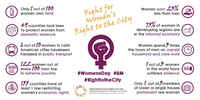Women's Right to the City Manifesto
1. A CITY that adopts all necessary measures - regulations, urban planning, economic and social- to combat all forms of discrimination against women and girls; takes all necessary measures to ensure their full development; guarantees their equality in the exercise and realization of their rights, especially those of women living in poverty, Afro-descendants, indigenous, displaced, migrants, mestizo, LGBTQIA, and women and girls with disabilities, among others.
2. A CITY that guarantees parity in women's full and effective political participation and equal opportunities for leadership at all decision-making levels in the political, social, cultural, economic and public dimensions of life, while strengthening women’s voices and creating spaces and resources for their agendas.
3. A CITY free from violence -physical, psychological, verbal, material or symbolic - against women in the public and private spheres, that ensures the safe use and enjoyment of public spaces and common goods and guarantees freedom of mobility. A CITY where fear is not a limit to their freedoms. A CITY that ensures women's right to decide about their own bodies.
4. A CITY that guarantees protection of women, including refugees, in times of war, occupation and conflict. In a time when armed conflict and displacement are increasingly urban phenomena, special attention must be given to the particular threats, vulnerabilities, and needs of women. It is the responsibility of the international community to tackle the root causes of these conflicts that so gravely effect vulnerable communities, including women.
5. A CITY that guarantees realization of the human adequate housing , security of tenure for women, heritage rights, access to drinking water, sanitation and hygiene, in particular for women who have sole parental and household responsibility.
6. A CITY that recognizes, values and redistributes the work involved in the care of dependent persons and community care that is undertaken primarily by women. These tasks are mainly developed by women, but should be a public and social responsibility, to be developed in an equitable manner by all people and included and budgeted in public policies.
7. A CITY that guarantees women's equitable and affordable access to the goods, public services and opportunities provided by cities, that incorporate the needs of women, with special attention to the care of children, the elderly and dependent disabled such as childcare services, food and nutrition, health services, quality public transport that responds to women's mobility needs, decent public lighting, functional sanitary facilities, decent work place and infrastructure for informal workers who are mostly women, as well as cultural opportunities for women, especially young women.
8. A CITY that promotes the economic autonomy of women, guaranteeing equality in employment, dignity and equal remuneration for all under equal conditions, recognition of women's informal work, a decisive source of income in cities. A CITY that changes the power relations between men and women, families, the market and the state, transforming the city according to the collective needs of women.
9.A CITY where women have an active and decisive voice in the process of planning, design, production, use and occupation of urban spaces. Where the urban planning process places the needs, uses and desires of people's diversity at the centre of agendas, not omitting women and other identities.
10. A CITY that takes into account the diversity of women , according to differences in age, physical capacities, origin, nationality, ethnicity, religion, race, economic condition, sexual orientation, religion or politics. A CITY that respects communal bonds and identities , fostering social relations and cultural exchange, without discrimination against women due to traditions, practices or social customs.
11. A CITY that promotes gender equality when accessing credit and access to markets; and that defends the environment and life. A CITY that eliminates social, economic and gender inequalities between rural and urban areas; that values peasant agricultural forms of production and urban agriculture, central to urban life. A city that recognizes the decisive link between rural and urban areas .
* Watch the video: How can we make the Right to the City a reality for women?
Group for Gender Inclusion UN Habitat
Articulacion Feminista Marcosur
AVP Asociacion Vivienda Popular Colombia
Centro de la Mujer Peruana Flora Tristán
CISCSA Centro de Intercambios y Servicios Cono Sur Argentina
Cities Alliance
Colectiva Feminista, Rep El Salvador
Collectiu Punt 6
Corporacion SUR Chile
GAP Mujeres / Women
Gender HUB UNI UN Habitat
Flora Tristan Lima, Peru
Fundacion Guatemala
Habitar Argentina
Habitat International Coalition (HIC)
Huairou Comission
International Alliance of Inhabitants (IAI)
Madre Tierra Argentina
Polis Institute
Red Mujer y Hábitat
RIPESS
Safetipin India
SOS Corpo
SUR Corporación
União Nacional por Moradia Popular
Women in Cities International (WICI)
Women in Informal Employment: Globalizing & Organizing (WIEGO)

